#my good omens meta
Text
I think Crowley falls into two of the classic pitfalls of people who see that the problems are systemic long before anyone else around them does: impatience and despair.
(Yes yes I know, “Crowley was an optimist.” Book Crowley is an optimist. I don’t think that line is particularly useful for analyzing TV Crowley. Stay with me here.)
Let it be said that 95% of the time, Crowley has the patience of a fucking saint (ssh don’t tell him) around Aziraphale. He knows that Aziraphale needs to build his little plausible deniability rationales in order to do something that they both know he wants to do (because it’s right or simply because he would enjoy it) but Heaven wouldn’t approve of. And most of the time, Crowley is happy to help Aziraphale get there, asking the questions Aziraphale is afraid to ask, offering excuses and justifications until Aziraphale finds one he can accept. He does a lot of work of parsing out when “no” means “you haven’t convinced me yet, keep trying” and pushing through all the “I’m an angel, you’re a demon, we’re on opposite sides and mine is the good one” talk that Aziraphale gets up to all the way through s1. Because he knows that Aziraphale doesn’t really believe that stuff, right? He just needs some time to talk himself around his own cognitive dissonance, and most of the time Crowley is not only happy to facilitate that but sees it as part of his role in their relationship.
But then when the chips are down and Aziraphale is still dithering, that’s when he gets frustrated, because HOW CAN YOU NOT SEE what’s been blindingly obvious to Crowley for millennia, that Heaven is just as cruel as Hell and no one is going to step in and fix it because the system is working as intended. And that’s when he says things like “how can someone as clever as you be so stupid?” Which is a surefire way not to convince the person you’re arguing with of anything.
And then there’s the despair. I really think the running away thing is not about cowardice or selfishness or some kind of unhealthy level of avoidance of hard or scary things, but about hopelessness. They’ve spent their lives avoiding very very real danger, and of the two of them Crowley is much more constantly aware of the danger that they are in from both sides. Yes he’s hypervigilant but he is also almost always right about the amount of danger they are in. Trying to get as far away from danger as possible is not an irrational response, even if it’s not always the correct one for a given situation.
When you feel like you’re the only person who sees how rotten the system is, how it needs to be dismantled entirely, but you are also VERY aware of how strong the people in power are and how ruthless they are about crushing dissent because you experienced it personally…well that gets fucking depressing after a while. Because even if you think the whole system needs to go, that feels like a completely unattainable goal when it seems like no one else even sees the problem, or if they see it, they are too afraid to do anything about it. And can you blame them? You know exactly what happens to people who speak up.
So it’s very easy for your goals to shrink from systemic change to just taking yourself and the people you love and finding somewhere for them to be as safe as possible, for as long as the system will let you exist. Because reforming the system is a fool’s errand, and dismantling it entirely seems impossible. I think this is where Crowley is at. Even if on some level he knows it’s an imperfect solution, because both of them have enough compassion that they would feel guilty abandoning Earth and humans to save themselves, and because Heaven and Hell really can find them anywhere in the universe. He just doesn’t see another option.
And look, I think Aziraphale is 100% wrong that Heaven can be reformed. But he is not wrong to want to stay and fight to make things better, even if it means sacrificing the Earthly comforts he loves so much, and even if it means doing it without Crowley by his side.
Ultimately they both need each other. Aziraphale needs Crowley for his willingness to ask questions and to see the scale of the problem, even if it’s terrifying. But Crowley needs Aziraphale for his hope, his stubborn determination to believe things can and should be better, and to fight for that. In the right hands, hope is an enormously powerful weapon.
2K notes
·
View notes
Text
Ok ok ok but the THING the thing that GETS ME about Aziraphale and I feel like I don't see as much about it written on here is that yes we all know that Crowley pretends to be cynical and dark because he wants so badly to be joyful and optimistic but he's been hurt & let down too many times so he puts up the cynicism as a facade.
But Aziraphale is ALSO DOING THIS, just using the opposite tactic.
Crowley assumes everything will go badly because he's protected from disappointment when it does, and gets to be pleasantly surprised when it doesn't.
Aziraphale assumes everything will go well because he's unBELIEVABLY anxiety-ridden ALL THE TIME and cannot deal emotionally with even the prospect of things going wrong. So not only does he optimism his way out of seeing issues that are right in front of him until he absolutely can't avoid them any longer (see: dancing in his bookshop surrounded by demons), but he also actively gaslights himself into thinking that the bad things that happened to him or that he was involved in weren't that bad, and pretends that he doesn't have negative emotions and is just fine and happy all the time because he doesn't know what to DO with those feelings-- he's an angel! He's supposed to be placidly happy forever! What do you mean he's angry or sad or disappointed or disgusted or lonely? Angels don't feel those things!
Season 2 showed us Crowley getting in touch with his feelings of love and care, and I think season 3 is going to show us Aziraphale getting in touch with his feelings of anger and disappointment, and I for one CANNOT WAIT.
#good omens#good omens s2#aziraphale#good omens meta#good omens spoilers#anyway Aziraphale read Sara Ahmed's feminist killjoy handbook#I'm definitely not doing any projecting on this character why do you ask?#9:30 on a Thursday and it's Aziraphale kinnie hours#my good omens meta#sitzfleischh.meta
2K notes
·
View notes
Text
Rewatching A Companion to Owls because that was my favorite episode in the whole Good Omens season 2 (probably my favorite episode in the whole Good Omens TV universe so far if I’m being honest)
As far as we know, Aziraphale was the one who first claimed that they were, in that case, on the same side.
Before 2500 BC both of them were probably just circling each other when they did meet on earth. But that event/cooperation really set the foundation of their relationship emotionally imo. Before that, they talked about each side’s plans that they couldn’t outright disagree but nothing too personal.
After that, though, there was more vulnerability and emotion showed in their conversation. We could see Crowley’s bad mood and Aziraphale’s nervousness was more towards his head office but not towards Crowley. Aziraphale saying “I don’t like this either but I can’t (except when we could win the day using a trick)”
Also, when Crawly said he was on his own side, Aziraphale replied with:”that sounds…” and Crawly challenged: “What?”
This time rewatching, it hit me that, for a moment Crawly might guess, or we as audience might guess, that Aziraphale would claim him to be hubris. That’s probably what Crawly got a lot from both Heaven and Hell. For questioning what had created him in the first place and what could destroy him in a blink.
However, Aziraphale didn’t say anything even close to that. Aziraphale recognized it because he also tasted it before.
It was loneliness.
So many people or beings alike, they viewed asking questions, giving different opinions as rebellious and refusal of connection while it was actually the opposite. That was an act of reaching out and to connect more deeply, to understand and to be understood. Yet it was called too curious for their own good at best, asking to be casted out at worst. It was blamed as not humble and hubris. While at its core it was nothing but frustration of failing to connect to something they deeply cared.
And that was indeed awfully lonely.
#good omens meta#crowley#aziraphale#aziracrow#ineffable husbands#good omens discussion prompt#a companion to owls#good omens 2500bc#the story of good omens is about many things and one of them to me is loneliness#my good omens meta
85 notes
·
View notes
Text
I’m seeing a lot of discussions on s2 and what I don’t get is why people are saying “Aziraphale is OOC because he would N E V E R give up his books/bookshop so easily!!!” and I’m here like: 🧍♂️
I mean sure, his bookshop has been his joy and pride for what, 200-300 years? A haven for him, a place to call home and start hoarding books like crazy. But most importantly, it was a base for all his heavenly work on Earth.
Some could argue the bookshop was the result of a lifetime spent building a life on Earth... Or is it? Aziraphale is a supernatural being that has existed for millennia, long before Earth even was a thing. Why do people believe that 200 years of bookshop could suddenly override millennia of indoctrination from heaven?
He’s an immortal being, material possessions are relatively new for him, 200 years is nothing. Furthermore, imagine how many homes he had to leave behind in his 6000 years of living on Earth, before settling in London. Probably dozens. How readily he probably had to abandon them when heaven called him back to do a new job in a new part of the world. He’s probably learnt not to get too attached. 200 years for him are probably like 5-10 years for a human. He’s used to moving. But this time, with heaven offering him an actual chance at changing things (since Azi is convinced heaven was bad just because Gabriel was the bad apple ruining a small batch), he’s sure he can solve things once and for all, saving himself and Crowley in the process.
It makes a lot of sense to me how readily he was getting “rid” of it all in the hope of a better future, and btw, he didn’t actually abandon anything??? He knows Muriel will take good care of his shop, and as the Supreme Mega Archangel he will surely visit frequently to see how she’s doing, he just moved into his office, but he still own the bookshop/cares about it.
The more I think about it all, the more it doesn’t seem OOC at all.
#good omens#good omens 2#s2#s2e06#meta#my good omens meta#my meta#can we call this meta?#good omens reflections#my good omens reflections#spoilers#good omens spoilers#gos2 spoilers
10 notes
·
View notes
Text
Awhile ago @ouidamforeman made this post:
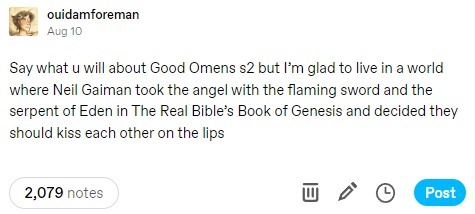
This shot through my brain like a chain of firecrackers, so, without derailing the original post, I have some THOUGHTS to add about why this concept is not only hilarious (because it is), but also...
It. It kind of fucks. Severely.
And in a delightfully Pratchett-y way, I'd dare to suggest.
I'll explain:
As inferred above, both Crowley AND Aziraphale have canonical Biblical counterparts. Not by name, no, but by function.
Crowley, of course, is the serpent of Eden.
(note on the serpent of Eden: In Genesis 3:1-15, at least, the serpent is not identified as anything other than a serpent, albeit one that can talk. Later, it will be variously interpreted as a traitorous agent of Hell, as a demon, as a guise of Satan himself, etc. In Good Omens --as a slinky ginger who walks funny)
Lesser known, at least so far as I can tell, is the flaming sword. It, too, appears in Genesis 3, in the very last line:
"So he drove out the man; and placed at the east of the garden of Eden Cherubims, and a flaming sword which turned every way, to keep the way of the tree of life."
--Genesis 3:24, KJV
Thanks to translation ambiguity, there is some debate concerning the nature of the flaming sword --is it a divine weapon given unto one of the Cherubim (if so, why only one)? Or is it an independent entity, which takes the form of a sword (as other angelic beings take the form of wheels and such)? For our purposes, I don't think the distinction matters. The guard at the gate of Eden, whether an angel wielding the sword or an angel who IS the sword, is Aziraphale.
(note on the flaming sword: in some traditions --Eastern Orthodox, for example-- it is held that upon Christ's death and resurrection, the flaming sword gave up it's post and vanished from Eden for good. By these sensibilities, the removal of the sword signifies the redemption and salvation of man.
...Put a pin in that. We're coming back to it.)
So, we have our pair. The Serpent and the Sword, introduced at the beginning and the end (ha) of the very same chapter of Genesis.
But here's the important bit, the bit that's not immediately obvious, the bit that nonetheless encapsulates one of the central themes, if not THE central theme, of Good Omens:
The Sword was never intended to guard Eden while Adam and Eve were still in it.
Do you understand?
The Sword's function was never to protect them. It doesn't even appear until after they've already fallen. No... it was to usher Adam and Eve from the garden, and then keep them out. It was a threat. It was a punishment.
The flaming sword was given to be used against them.
So. Again. We have our pair. The Serpent and the Sword: the inception and the consequence of original sin, personified. They are the one-two punch that launches mankind from paradise, after Hell lures it to destruction and Heaven condemns it for being destroyed. Which is to say that despite being, supposedly, hereditary enemies on two different sides of a celestial cold war, they are actually unified by one purpose, one pivotal role to play in the Divine Plan: completely fucking humanity over.
That's how it's supposed to go. It is written.
...But, in Good Omens, they're not just the Serpent and the Sword.
They're Crowley and Aziraphale.
(author begins to go insane from emotion under the cut)
In Good Omens, humanity is handed it's salvation (pin!) scarcely half an hour after losing it. Instead of looming over God's empty garden, the sword protects a very sad, very scared and very pregnant girl. And no, not because a blameless martyr suffered and died for the privilege, either.
It was just that she'd had such a bad day. And there were vicious animals out there. And Aziraphale worried she would be cold.
...I need to impress upon you how much this is NOT just a matter of being careless with company property. With this one act of kindness, Aziraphale is undermining the whole entire POINT of the expulsion from Eden. God Herself confronts him about it, and he lies. To God.
And the Serpent--
(Crowley, that is, who wonders what's so bad about knowing the difference between good and evil anyway; who thinks that maybe he did a GOOD thing when he tempted Eve with the apple; who objects that God is over-reacting to a first offense; who knows what it is to fall but not what it is to be comforted after the fact...)
--just goes ahead and falls in love with him about it.
As for Crowley --I barely need to explain him, right? People have been making the 'didn't the serpent actually do us a solid?' argument for centuries. But if I'm going to quote one of them, it may as well be the one Neil Gaiman wrote ficlet about:
"If the account given in Genesis is really true, ought we not, after all, to thank this serpent? He was the first schoolmaster, the first advocate of learning, the first enemy of ignorance, the first to whisper in human ears the sacred word liberty, the creator of ambition, the author of modesty, of inquiry, of doubt, of investigation, of progress and of civilization."
--Robert G. Ingersoll
The first to ask questions.
Even beyond flattering literary interpretation, we know that Crowley is, so often, discreetly running damage control on the machinations of Heaven and Hell. When he can get away with it. Occasionally, when he can't (1827).
And Aziraphale loves him for it, too. Loves him back.
And so this romance plays out over millennia, where they fall in love with each other but also the world, because of each other and because of the world. But it begins in Eden. Where, instead of acting as the first Earthly example of Divine/Diabolical collusion and callousness--
(other examples --the flood; the bet with Satan; the back channels; the exchange of Holy Water and Hellfire; and on and on...)
--they refuse. Without even necessarily knowing they're doing it, they just refuse. Refuse to trivialize human life, and refuse to hate each other.
To write a story about the Serpent and the Sword falling in love is to write a story about transgression.
Not just in the sense that they are a demon and an angel, and it's ~forbidden. That's part of it, yeah, but the greater part of it is that they are THIS demon and angel, in particular. From The Real Bible's Book of Genesis, in the chapter where man falls.
It's the sort of thing you write and laugh. And then you look at it. And you think. And then you frown, and you sit up a little straighter. And you think.
And then you keep writing.
And what emerges hits you like a goddamn truck.
(...A lot of Pratchett reads that way. I believe Gaiman when he says Pratchett would have been happy with the romance, by the way. I really really do).
It's a story about transgression, about love as transgression. They break the rules by loving each other, by loving creation, and by rejecting the hatred and hypocrisy that would have triangulated them as a unified blow against humanity, before humanity had even really got started. And yeah, hell, it's a queer romance too, just to really drive the point home (oh, that!!! THAT!!!)
...I could spend a long time wildly gesturing at this and never be satisfied. Instead of watching me do that (I'll spare you), please look at this gif:
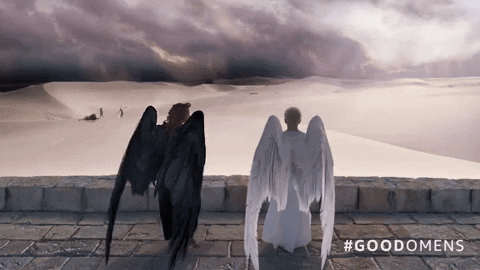
I love this shot so much.
Look at Eve and Crowley moving, at the same time in the same direction, towards their respective wielders of the flaming sword. Adam reaches out and takes her hand; Aziraphale reaches out and covers him with a wing.
You know what a shot like that establishes? Likeness. Commonality. Kinship.
"Our side" was never just Crowley and Aziraphale. Crowley says as much at the end of season 1 ("--all of us against all of them."). From the beginning, "our side" was Crowley, Aziraphale, and every single human being. Lately that's around 8 billion, but once upon a time it was just two other people. Another couple. The primeval mother and father.
But Adam and Eve die, eventually. Humanity grows without them. It's Crowley and Aziraphale who remain, and who protect it. Who...oversee it's upbringing.
Godfathers. Sort of.
#good omens#ineffable husbands#aziracrow#good omens 2#crowley#aziraphale#good omens meta#I have no idea if I've made a coherent point here but I'm tired of this being in my drafts; RAW FEELINGS IT IS#it's about being sent to destroy and instead staying to love and protect and nurture I'M CRAZY I'M CRAZY RAAAAAAAGGHHHH#gnu terry pratchett
26K notes
·
View notes
Text
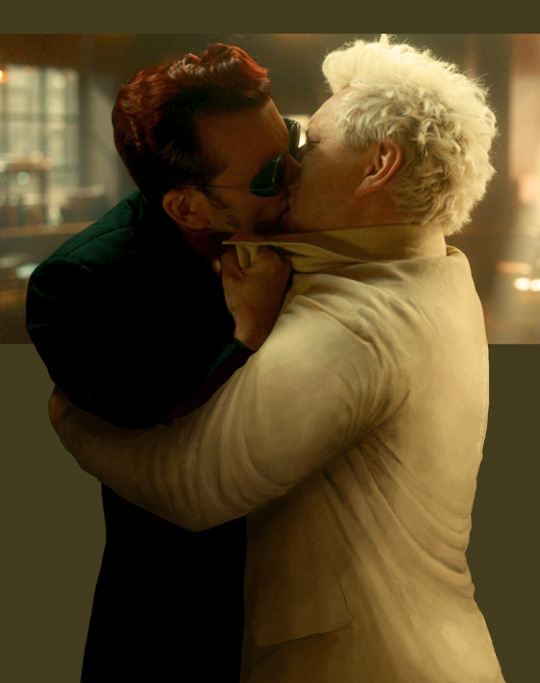
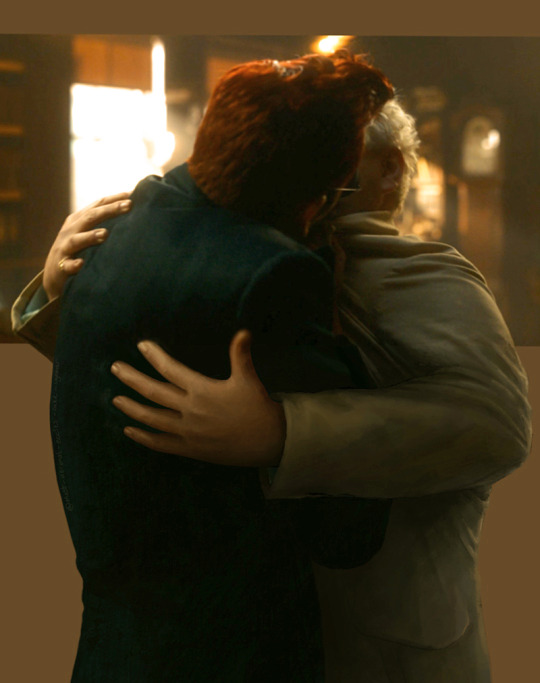
The products of trying to recreate what was going on outside the frame during the kiss. (for ENTIRELY SCIENTIFIC purposes)
@actual-changeling altered my whole outlook on life with this post about Aziraphale's left hand (I'd only been looking at his right hand) and I couldn't stop thinking about it, so I painted the rest of the fucking owl (and his bf).
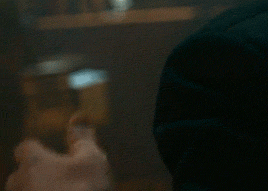
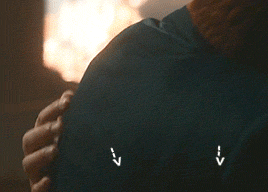
so normal about this
#good omens fanart#ineffable fanart#crOWLey#aziraphale#good omens 2#good omens#lord gaiman stokes the fires of our creativity#bless also michael sheen and david tennant#i think I’ve earned my eye dropper tool merit badge#now I can go back to sobbing and writing the aziraphale meta#good omens s2e6#aziracrow#crowley x aziraphale#good omens 2 spoilers#go2 spoilers#good omens spoilers
19K notes
·
View notes
Text
So, I was rewatching the kiss scene frame-by-frame, as one does, and I realized something. First I thought, well, Alex, you probably saw that wrong, let’s keep going. A minute later, however, I was confronted with the reality of no, not mistaken.
Maybe I am late to the party and everyone has already seen it and knows about it, but in case there are people that haven’t: Aziraphale not only puts his hand on Crowley’s back, he puts his left one on his waist BEFORE that.
Not just that, he slides it up and also uses it as leverage to pull Crowley closer. I could go through those few seconds one frame at a time, but that would take forever, so I will give you the highlights in chronological order.

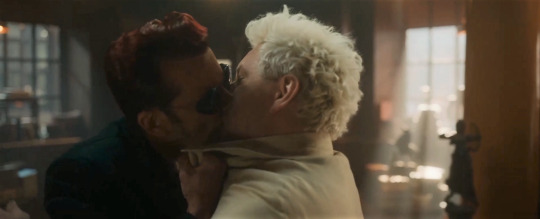

His hands flutter around at first and don’t settle anywhere, which is actually really useful since it shows us what the angle for that looks like.
Now, the next time his left hand moves up, look at the progression. It does not go down the same way as before. Instead, it moves inward and against Crowley’s waist. And it STAYS THERE right up until he moves both of his hands away.
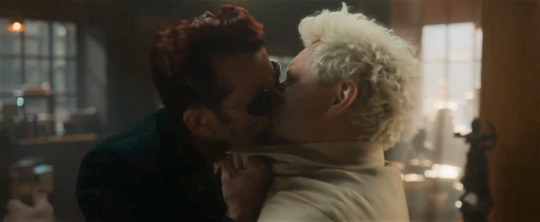
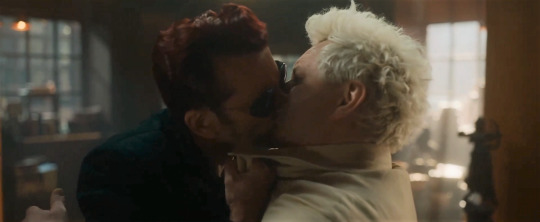
Look at the angle!!!! Look at how it moves INWARD and towards Crowley instead of straight down like before.
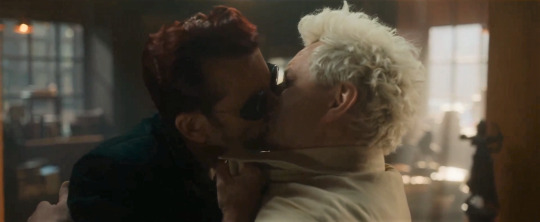
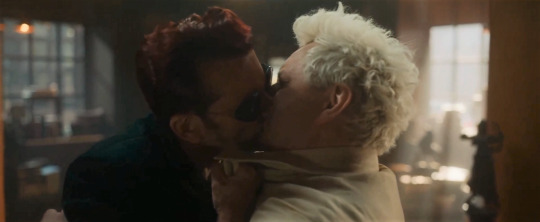
Still moving towards Crowley with a slight downwards drift because he is aiming for his waist.
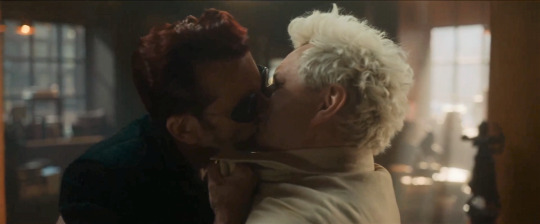
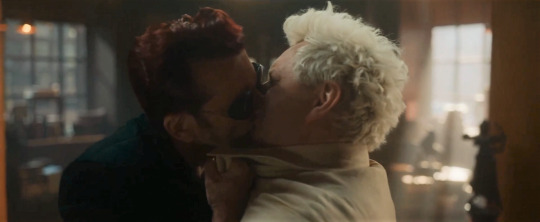
Now it is too low for us to see but I think it is very obvious where his hand has settled. Maybe I am going insane after only thinking about this show for almost a month straight. Maybe not. Call me crazy but the angle here is DIFFERENT. The second one very much looks like he is holding onto Crowley.
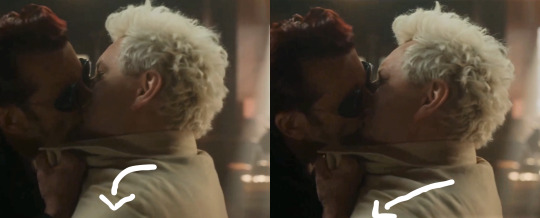
Aziraphale kisses back. Fully kisses back. Somehow, that wasn’t enough for Michael Sheen, no, he had to fully commit to it and *close his eyes* when he reciprocates, too. Look at this!!! The way his eyes flutter shut when Crowley first grabs him, then open, and then CLOSE AGAIN when he starts holding him in return. Kissing back with his eyes closed and his arms wrapped around him. The last picture is right before he moves his hand to his waist/the frame after the camera angle changes.

Anyone else losing it right now? No? Just me? That’s fine, although I most definitely am not. Fine, that is. Michael Sheen I’m sending you my fucking therapy bills.
#alex talks good omens#good omens#ineffable husbands#crowley#aziraphale#good omens season 2#good omens meta#go2#aziracrow#crowley x aziraphale#someone please tell me they see it too or i gotta up my antipsychotics#half joking lmao
9K notes
·
View notes
Text
You know that moment when The Metatron was giving Crowley the death glare?
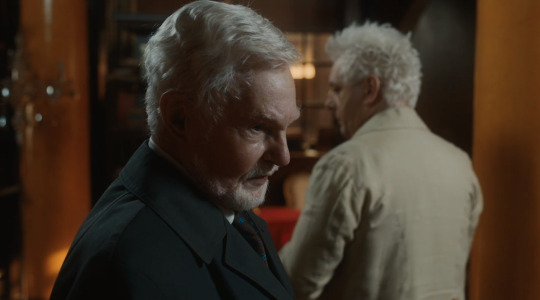
I just caught that Crowley was sneering right back at him.

This was the look on Crowley's face when the camera cuts back to him. It wasn't coming from just The Metatron, they were giving each other a prolonged look of very personal hatred.
#good omens#crowley#the metatron#good omens meta#placing my bet that The Metatron was involved in Crowley's fall
8K notes
·
View notes
Text
[Season 2 summed up]
Aziraphale's thoughts: Oh I shall team up with Crowley and make Nina and Maggie fall in love and make them confess. Oh what if I also confess then. I need to prepare everything to set the scene.
Still Aziraphale's thoughts: Ooohh a ball with dancing and tiny snacks to make it fancy and it will be like a Jane Austen novel coming to life and then I will ask Crowley to dance and all our problems will go away as I stare into his eyes....
Crowley's thoughts: Keep Aziraphale safe Keep Aziraphale safe Keep Aziraphale safe Keep Aziraphale safe FUCK YOU GABRIEL Keep Aziraphale safe Keep Aziraphale safe Keep Aziraphale safe PLEASE HOLD MY HAND AZIRAPHALE Keep Aziraphale safe JANE AUSTEN WAS AN AUTHOUR?!?! Keep Aziraphale safe-
#my autistic bastard and adhd disaster#poor souls cant communicate#AM I WRONG#good omens meta#good omens analysis#good omens 2#good omens#good omens season 2#incorrect good omens#good omens spoilers#neil gaiman#incorrect quotes#ineffable husbands#aziracrow#ineffable partners#aziraphale#anthony j crowley#david tennant#michael sheen#incorrect good omens quotes
5K notes
·
View notes
Text
If we DO ever get a Good Omens season 3 (and fingers crossed we will) then using the Second Coming as the narrative device to facilitate the final culmination of Good Omens' ideology and message is brilliant, actually.
Because the Second Coming IS NOT another Adam situation. And, contrary to the misconceptions I've seen, It IS NOT about Jesus being born again as a baby, etc, etc.
THE SECOND COMING. QUITE LITERALLY refers to THE LAST JUDGMENT.
As in. The SAME Last Judgment Michelangelo painted on the walls of the Sistine Chapel. As in - THE JUDGMENT of the Living and the Dead. THE LAST, FINAL, ETERNAL JUDGMENT.
It's the WHOLE thing Armageddon was leading towards. Book of Revelation speedrun: the world ends, everyone dies, and then they get resurrected again to be judged by JESUS himself. He will flick through the Book of Life (WINK WINK WINK DO YOU SEE HOW LOUDLY I'M WINKING AT YOU???), and if your name is there he will go "oh nice you deserve eternal paradise! :D" and if your name is ERASED from the Book of Life he will go "oh no, sorry, you go to the lake of fire for eternity now D:" (except apparently in Good Omens lore it'd just DOOM YOU TO NON-EXISTENCE FOREVER???)
And if you THINK about it, The Last Judgment is the ultimate manifestation of moral absolutism. No shades of gray, no chances. Just BLACK, and WHITE. Never mind that you're like Wee Morag and Elspeth, who are forced to do "bad" things because of circumstances. It's either you pass Judgment Day, or you burn (or disappear forever.)
And the way THINGS are going in the Good Omens universe? I don't think there's ANYONE "good" enough to be "saved." Not Crowley, not Aziraphale. Hell, not even the Archangels themselves.
So it provides a PERFECT opportunity for Aziraphale and Crowley to UPEND that SYSTEM entirely.
I think that's what Crowley and Aziraphale would do in s3: establish a new kind of system in which angels and demons have free will to determine the right (or wrong) choice.
Giving them the APPLE, so to speak.
And then they'll go off to retire in a cottage, together at last.
#good omens#good omens 2#good omens meta#ineffable husbands#aziraphale#crowley#im sorry but i choke everytime someone refers to a baby jesus for the second coming#like i love yall and parent trapping aziraphale and crowley by the infant son of god would be amusing as heck#but also i rlly think this is about the Last Judgment guys KSLDSKDKLDS#thank you good omens yes this IS in fact how i use my collection of niche trivia on christian eschatology#putting my religious trauma into good use iktr
6K notes
·
View notes
Text
it's the fact that Aziraphale still thinks Crowley's demon status is something that needs "fixing" 🥲 but it's also about Crowley not understanding that his "holiness" is an inherent part of Aziraphale and not something he'd give up voluntarily, it's about personal identities being lost in relationships, its about the romatinisation of "us", it's about Nina not understanding why Maggie sells records when you can stream it, it's about the inherent struggle between keeping you "you" while still finding space for "us"
#good omens#good omens 2#good omens spoilers#this season is making mincemeat of my brain#ineffable husbands#crowley#aziraphale#good omens meta#meow speaks
7K notes
·
View notes
Text
So one of the things that Good Omens, the book in particular, points out again and again, is that Heaven and Hell are functionally the same. “Anyway, why are we talking about this good and evil?” book Crowley says. “They’re just names for sides. We know that.”
The two sides may seem ideologically opposed, but they do suspiciously similar things, and neither of them care about humanity. They’re both willing to destroy all life on Earth to prove whose gang is best. (There’s a bit of a Cold War analogy here that’s very obvious in the book.) That all was made very clear in season one.
But what the Job minisode shows is that Heaven and Hell are really one system, playing a game of good cop/bad cop with humans, angels and demons alike.
We learn that God and Satan not only talk to each other, but are on familiar enough terms to make a bet. (Which involves making some humans suffer to prove a point, very on brand for Good Omens’ God.) These are not some mid-level metaphysical bureaucrats sharing information through back channels that don’t exist but totally do. This is collusion at the highest level! They write up a contract and everything! And then Heaven simply stands back and lets Hell do its dirty work.
(Flash forward 4500 years to Aziraphale telling Crowley he should be the one to kill the Antichrist so Heaven doesn’t have “blood on its hands.”)
Heaven and Hell also work as a unified system to keep their respective angels and demons in line. Heaven needs Hell in order to ensure compliance in its own ranks. The Fall must have had a huge demonstration effect: this is what will happen to anyone else who steps out of line. Heaven mostly uses fear to control its own population, with the threat of falling always there to ensure obedience. And Hell is full of angry demons, isn’t it? Anger is pretty much the only emotion it’s socially acceptable for a demon to have, and Heaven is very useful for keeping that anger focused on an external target.
The Job storyline is the first time in the series we’ve seen Heaven and Hell working together so directly, but I don’t think it’ll be the last. They’re in the same building, after all. One of them just has a better view.
1K notes
·
View notes
Text
Okay inspired by this post by @irispurpurea and this post by @ouidamforeman (both of which are excellent, please read) I wanted to add some thoughts about the structural weirdness of season 2.
The reason season 2 feels so structurally WEIRD is that it's the second beat what is now a three act story, but that wasn't written as one in the first place.
Season 1 was a complete, self-contained story arc with completed character development, based on a complete, self-contained novel. The story of Good Omens is about an angel and a demon going from opposite sides to their own side, aligned with earth and its humans. And at the end of season one this story has been told! It's done!
If you want to keep the story going, then, you have two options -- either you find a completely new story to tell with these characters, or you do what Neil Gaiman et al have chosen to do and you complicate and unresolve the conclusion from the first story in order to tell the same story but in an even bigger and more nuanced way.
The challenge of season two, then, is to reframe the events of season one not as a completed story but as the first act of a three-act arc.
And genuinely I think this is just not the way that most TV shows tasked with writing their second season go about doing it. Not that this is a bad choice! But the reason it feels weird on first glance is because it's taking its structure from like... half of the sequel to a novel, not a TV show that gets a second season.
This is the point of all of the historical flashbacks in season 2-- to make us understand that Crowley and Aziraphale are not on the same page and haven't been for 6000 years, despite appearing to be by the end of the first season.
The other thing I think season 2 does is make the whole story about Crowley and Aziraphale's relationship in a way it just wasn't in season 1. Taken on its own, season one's A-plot is the apocalypse, and the B-plot is relationship between this angel and demon.
What season two does then is literally FLIP the importance of those two things structurally. Season one's apocalypse and various side characters now occupy the same place as the Gabriel mystery in season 2. Which is also why it feels so weird to be like "wait this thing that felt like The Big Important Thing before is now suddenly the background of something else."
All this to say, this season is SO structurally interesting because it's just straight up not like other TV shows in structure, and because of the way everything now has to be marketed and framed in trailers as one, more typical kind of story, AND because the first season was a complete story that has now been reframed as an incomplete story, Good Omens season two feels very weird but imo much less weird upon rewatching, and will again feel less weird once we have season 3 and the story gets to complete its arc.
#good omens meta#good omens#good omens analysis#good omens s2#anyway I have been THINKING THOUGHTS lately lmao#and the state of television right now is so fucked but also so interesting to me#if they told the exact same story but as a 12-episode second series instead of two 6-episode series#I think people would feel completely different about it -- myself included!#is Good Omens perfect? no. Do I love it with my whole heart forever? absofuckinglutely#my good omens meta#sitzfleischh.meta
474 notes
·
View notes
Text
The Coffee was not drugged. The Coffee reflected how we related to our own and other people's free will (of making one’s own choice)
So I read this post and agreed with it so much I felt myself vibrating. After a few hours of thinking about it, I wanted to ramble more under op’s post, initially, but found that it grew way too long. So, I decided to make a separate post.
After two months since Good Omens season 2 finale, my view of various theories/metas concerning the final fifteen minutes is that, I am okay with most of them as long as they don't erase Aziraphale’s agency.
Did Aziraphale genuinely want to fix Heaven with Crowley but with Crowley’s strong refusal he took the second best thing he thought he could get? I’m fine with that.
Did Aziraphale tried to fix Heaven to make it worthy of Crowley, the world he loved, and his idea of real goodness (he wouldn’t see the world suffer if he could help it) and with the newly-gained information of Second Coming he made his choice even though it broke his heart? I liked this a lot. It was my initial thought right after the finale and I’m still about 65-70% standing by this take.
Did Aziraphale lie to gain more wiggle room in an urgent, intense, and limited-resource situation while due to his own and Crowley’s backgrounds and characteristics they also hurt each other in the process? YES YES YES. Right now this is my favorite interpretation because it’s a realistic and complex bag of limitation/repression from the system, individual’s agency despite of it, free will and choices (never means we won’t make mistakes but always means we can still choose to do something), and their mutual (mis)understandings and relationship dynamics. It’s SO GOOD. It can lead to so many possibilities. It has its depth and enough twist for both characters and the audience. It well-reflected our world and can bring valuable discussions.
Was there something we weren’t shown and actually Aziraphale and Crowley had come up with some plan? I’m okay with that it might be fun.
What I personally don’t want (aside from “oh it’s all God’s plan God wanted them to love each other God is one of us”… but that’s another post I guess…) is to erase the weight of Aziraphale’s choice at the end of Season 2, along with all the good and bad and everything in between it could bring to the table and all the valuable exploration of “how could we thrive to make hard choices even (especially) under limited circumstances, with "a cup of coffee."
I believe that coffee did mean something though...
"Give me Coffee/Freedom or give me death."
Coffee means freedom to choose and free will. Coffee/freedom which Aziraphale was half-forced to take, meaning the “free” choice pushed upon you weren’t as “free” as it seemed after all. Especially true under our current capitalism world, wasn't it? But it was not completely drunk without Aziraphale's agency, either. Coffee/freedom which Crowley asked six shots of. Coffee/freedom which Nina served every day but still on her way to break free from a previous not-free situation. Coffee/freedom which Ms. Sandwich claimed tasted better when Nina was happy.
I think it's also worth mentioning that, Aziraphale served Muriel tea and demonstrated how to drink it but respected their choice not to drink just yet. Aziraphale invited Jim/Gabriel to have a cup of cocoa which Jim/Gabriel described as the best thing ever.
The coffee was not drugged. The coffee was a metaphor of many different ways people could relate to their free will and ability/responsibility to choose.
The most interesting part was, theoretically, we people praise free will, we value choices, and we love love characters to have their agency...
Until they made a choice that we personally don't like, against our point of view, or hurt us.**
**This is also why I never truly believed Crowley would Refuse Aziraphale with capital R in canon... Crowley was definitely heartbroken, but between the two of them, he was also the one who valued and respected people making their own choices more. We saw he did that again and again even when he didn't personally agree. The only once he "took" away others choice in canon was to prevent a suicide.**
Then, that was free will no more. We'd framed it as if said individual was nonconsensual. Or the relationship must be bad or unhealthy. Which was understandable, emotionally, but that was also exactly the point of people having free will, wasn't it?
Giving people agency means acknowledging that they are different individuals from us. There's connection. There's love. There's devotion. They're still their own person just like we are our own. Giving people freedom to choose means they might, will, and should be allowed to choose differently. If their choices break our hearts. Well, they break our hearts. That happens because people are people.
People can't truly choose/love us freely if they aren't also given the freedom to not choose/love us. (Not saying Aziraphale and Crowley didn’t love each other because they definitely do. I’m just saying, they’ve been co-shaping humanity from the start of course they would act more and more like people, and to paraphrase what Adam once said, it made no sense to make people people and then be mad at them when they acted like, well, people)
Ursula Le. Guin wrote this short story called "Nine Lives" and it was about real, meaningful connections were created by reaching out a hand in the dark, without knowing for sure whether there would be other people to reach back.
It’s a practice. To love and to love under the blessing and curse of free will choice.
Idk I’m just… the “coffee was drugged theory” especially didn’t make sense to me personally, because Good Omens has always been a story about human free will.
#good omens#good omens meta#aziraphale#aziracrow#ineffable husbands#Aziraphale’s choice#my good omens meta
34 notes
·
View notes
Text
I don’t know why the realizations are hitting me all at the same time, but another thing I just remembered is how bummed out Crowley was to discover that Job had the possibility of asking questions to God without being killed on the spot. Aziraphale told him, just hours prior, that the only good thing of being a demon is that he can do all he wants. But is it really true?
As an angel, he couldn’t even communicate with god because god has no “suggestion inbox”, he could just do what he was told, no questions allowed. As a demon? He feels abandoned by god, sure he’s free to do what he wants, to a certain degree: he’s lonely, if he does so much as a small, minuscule good deed, he suffers the wrath of hell (Edinburgh episode). Doesn’t seem like he’s got much freedom, after all.
Imho Crowley does have some sort of trauma from all of this, it’s not just Aziraphale going through religious trauma, they’re just coming from 2 very different places, 2 very differing povs.
#good omens reflections#meta#good omens#good omens 2#s2e06#s2e02#gos2#gos2 spoilers#good omens spoilers#azirapha#spoilers#my good omens reflections#my good omens meta#my meta#crowley#dunno I feel like I will need to rewatch this season 7 times just to understand all the hidden plot bunnies#it seems like a silly little comedy in appearance#but in reality there's so many things going on plot wise#we just need to get the pink goggles off and start analyzing#lol
11 notes
·
View notes
Text

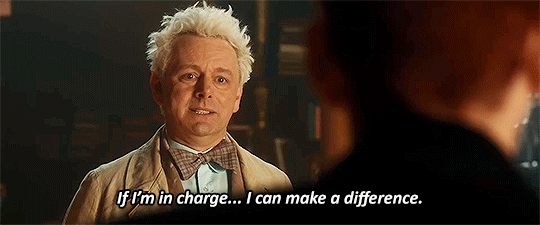

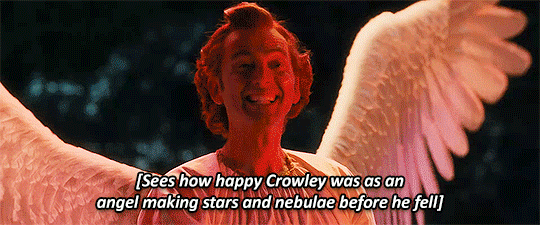



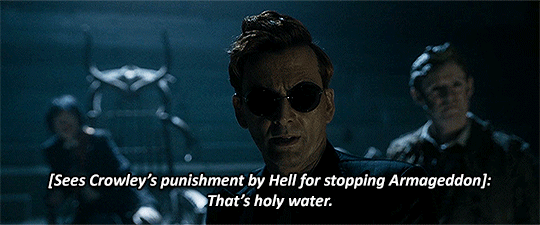


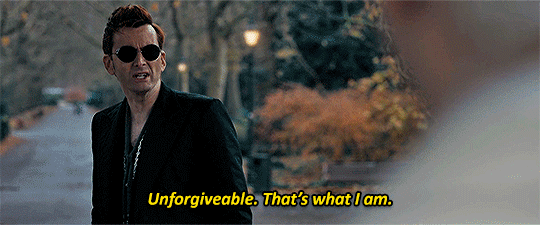
Aziraphale's POV
Based on an excellent analysis (pt. 1, pt. 2) by @twilightcitysky!
Crowley’s POV
#good omens#goodomensedit#good omens season 2#good omens 2#good omens spoilers#aziraphale#crowley#ineffable husbands#good omens meta#my gifs
5K notes
·
View notes